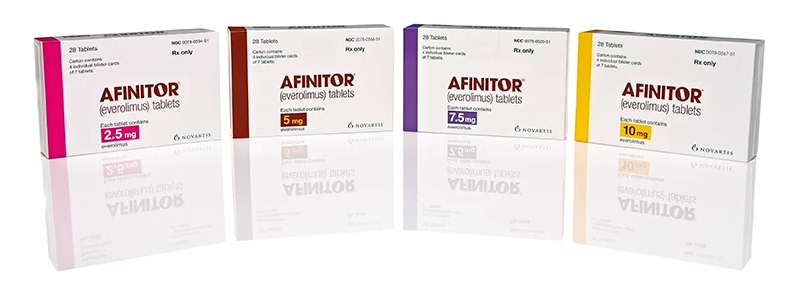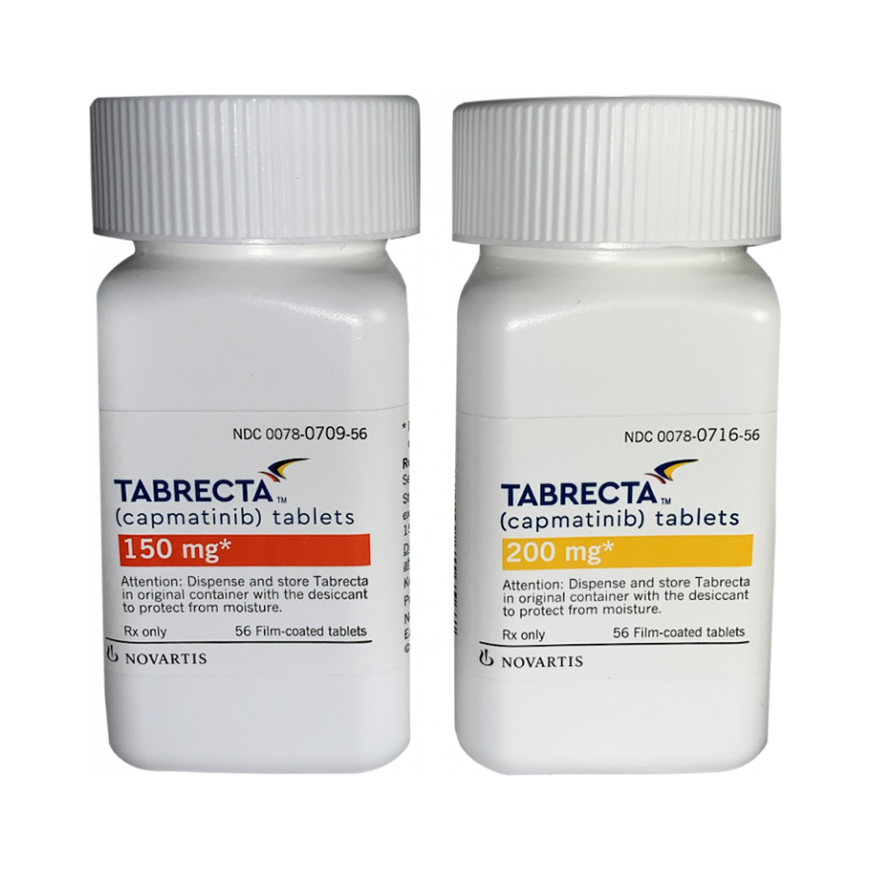Afinitor (everolimus) vs Tabrecta (capmatinib)
Afinitor (everolimus) vs Tabrecta (capmatinib)
Afinitor (everolimus) is an mTOR inhibitor that is used to treat various types of cancers, including advanced renal cell carcinoma, certain breast cancers, and neuroendocrine tumors, among others. Tabrecta (capmatinib), on the other hand, is a selective MET inhibitor indicated for the treatment of adults with metastatic non-small cell lung cancer (NSCLC) that have specific mutations known as MET exon 14 skipping mutations. When deciding between Afinitor and Tabrecta, it is crucial to consider the specific type of cancer and its genetic profile, as Tabrecta is specifically approved for use in a subset of NSCLC patients with a particular genetic alteration, whereas Afinitor has a broader range of indications but would not be suitable for MET exon 14-skipping mutated NSCLC.
Difference between Afinitor and Tabrecta
| Metric | Afinitor (everolimus) | Tabrecta (capmatinib) |
|---|---|---|
| Generic name | Everolimus | Capmatinib |
| Indications | Advanced hormone receptor-positive, HER2-negative breast cancer, advanced neuroendocrine tumors, renal cell carcinoma, tuberous sclerosis complex-associated seizures, subependymal giant cell astrocytoma, and renal angiomyolipoma | Metastatic non-small cell lung cancer (NSCLC) with MET exon 14 skipping mutations |
| Mechanism of action | mTOR inhibitor | MET kinase inhibitor |
| Brand names | Afinitor, Zortress | Tabrecta |
| Administrative route | Oral | Oral |
| Side effects | Mouth ulcers, infections, rash, fatigue, diarrhea, edema, abdominal pain, nausea, fever, pneumonitis, among others | Nausea, vomiting, diarrhea, muscle and joint pain, dyspnea, edema, fatigue, decreased appetite, among others |
| Contraindications | Hypersensitivity to everolimus or other rapamycin derivatives | Hypersensitivity to capmatinib or any component of the formulation |
| Drug class | mTOR inhibitor, immunosuppressant | Kinase inhibitor |
| Manufacturer | Novartis | Novartis |
Efficacy
Efficacy of Afinitor (Everolimus) in Lung Cancer
Afinitor (everolimus) is a medication that has been primarily used in the treatment of various types of cancers, including advanced renal cell carcinoma and certain types of breast cancer. In the context of lung cancer, everolimus has shown some efficacy in the treatment of advanced, progressive, non-functional neuroendocrine tumors (NETs) of lung origin. However, it is important to note that its use in lung cancer is not as well-established as in other types of cancer. Clinical trials and studies have explored the potential benefits of everolimus in lung cancer, with some showing a modest improvement in progression-free survival in patients with certain types of lung NETs.
Efficacy of Tabrecta (Capmatinib) in Lung Cancer
Tabrecta (capmatinib) is a more recent addition to the lung cancer treatment landscape, specifically for non-small cell lung cancer (NSCLC). Capmatinib is a kinase inhibitor that targets the MET gene, which can be aberrantly activated in some NSCLC patients. The efficacy of Tabrecta has been demonstrated in clinical trials for patients with metastatic NSCLC that have alterations in the MET gene, such as MET exon 14 skipping mutations. In these trials, capmatinib has shown a significant response rate, providing a new treatment option for a previously difficult-to-treat patient population.
For instance, the GEOMETRY mono-1 trial, a phase II study, showed that treatment with Tabrecta led to a substantial number of patients achieving partial or complete response, particularly in those who were previously untreated for their MET exon 14 mutated NSCLC. The response rates and duration of response observed in this trial were encouraging and led to the accelerated approval of Tabrecta by the FDA for this specific indication.
It is important for patients and healthcare providers to consider the specific genetic and molecular characteristics of lung cancer when evaluating the efficacy of treatments like Afinitor and Tabrecta. The presence of particular mutations or alterations can significantly influence the response to these targeted therapies. As such, molecular testing for genetic alterations such as those in the MET gene is critical in the personalized approach to lung cancer treatment, ensuring that medications like Tabrecta are used in the most appropriate patient populations.
Regulatory Agency Approvals
Afinitor
-
European Medical Agency (EMA), European Union

-
Food and Drug Administration (FDA), USA

-
Health Canada

-
Pharmaceuticals and Medical Devices Agency (PMDA), Japan

-
Therapeutic Goods Administration (TGA), Australia

Tabrecta
-
European Medical Agency (EMA), European Union

-
Food and Drug Administration (FDA), USA

-
Pharmaceuticals and Medical Devices Agency (PMDA), Japan

Access Afinitor or Tabrecta today
If Afinitor or Tabrecta are not approved or available in your country (e.g. due to supply issues), you can access them via Everyone.org.
How it works

Make an enquiry
Choose the medicine you want to buy, answer a couple of questions, and upload your prescription to speed things up. We’ll get back to you within 24 hours.


Make an enquiry
Choose the medicine you want to buy, answer a couple of questions, and upload your prescription to speed things up. We’ll get back to you within 24 hours.


Breeze through the paperwork
We'll guide you through the required documents for importing unapproved medicine, ensuring you have all the necessary information.


Get a personalized quote
We’ll prepare a quote for you, including medicine costs and any shipping, administrative, or import fees that may apply.


Receive your medicine
Accept the quote and we’ll handle the rest - sourcing and safely delivering your medicine.

Some text on this page has been automatically generated. Speak to your physician before you start a new treatment or medication.
Let's talk
If you have any questions, call us or send us a message through WhatsApp or email:
Contact us




